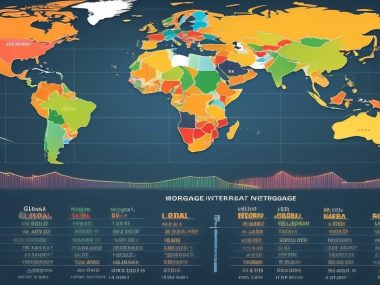Exploring the concept of mortgages in Islamic law sheds light on unique principles governing financial transactions. Unlike conventional mortgages, Islamic law prohibits interest payments, emphasizing ethical and equitable lending practices. Understanding how Islamic mortgages operate reveals a system based on profit-sharing and asset ownership, fostering cooperation between lenders and buyers. Delving into this topic unveils a fascinating intersection of religious beliefs and financial dealings, offering insights into alternative approaches to home financing within Islamic finance, including mortgage alternatives and murabaha transactions.
Key Takeaways
- Understand the key differences between conventional and Islamic mortgages to make an informed decision.
- When choosing an Islamic mortgage, consider the various types available and select one that aligns with your financial goals and beliefs.
- Ensure that the Sharia compliance process is followed diligently to maintain the ethical and legal standards of Islamic finance.
- Take advantage of the benefits of Islamic mortgages such as no interest payments and shared risk arrangements for a more equitable financial solution.
- Be prepared to face challenges in Islamic mortgages, including potentially higher upfront costs and limited availability of certain products.
- Stay informed about the future trends in Islamic mortgages to adapt to changing market dynamics and make well-informed decisions.
Islamic Mortgage Basics
Sharia Principles
Islamic mortgages, a form of home financing, are rooted in Sharia law, guiding principles that govern Islamic finance. They emphasize fairness, transparency, and ethical conduct. Adhering to Sharia principles is crucial in Islamic mortgages to ensure transactions comply with Islamic teachings. These principles prohibit riba (interest) and promote risk-sharing and asset-backed transactions.
In Islamic finance, riba is considered exploitative and unjust, hence its prohibition in financial dealings. Islamic mortgages offered by the bank ensure home buyers do not incur interest charges, from application to closing. This aligns with the ethical standards of Sharia law, promoting equitable wealth distribution and social justice. The absence of riba fosters a more inclusive financial system, benefiting both lenders and borrowers.
Riba-Free Transactions
Asset-backed financing is a fundamental aspect of Islamic mortgages, where tangible assets like properties serve as collateral. This practice ensures that transactions are grounded in real economic activities, reducing speculation and promoting stability. By utilizing asset-backed financing, Islamic mortgages uphold the principles of fairness and accountability.
Conventional vs Islamic Mortgages
Interest Payments
Traditional mortgages involve interest payments, adding to the overall cost of borrowing money. In contrast, Islamic mortgages follow Sharia law, where interest is prohibited. Interest payments in conventional mortgages can lead to significant debt accumulation over time. On the other hand, Islamic mortgages focus on profit-sharing instead of charging interest.
Islamic mortgages offer an ethical approach by eliminating interest-based transactions, aligning with Islamic principles. This alternative ensures fairness and transparency in financial dealings.
Risk Sharing
In Islamic mortgages, risk-sharing is a fundamental concept. Unlike traditional mortgages, where risks are mostly borne by the borrower, Islamic finance distributes risks between the lender and the borrower. This sharing of risk encourages a collaborative approach between both parties, fostering mutual trust and responsibility.
The benefits of risk-sharing arrangements in Islamic finance include promoting financial stability and reducing the burden on individual borrowers.
Contract Structure
Islamic mortgages have a unique contract structure based on shared ownership or lease agreements. The partnership between the lender and the borrower is evident in these contracts. A clear and transparent contract structure is crucial in Islamic mortgages to ensure compliance with Sharia law and mutual understanding between all involved parties.
Types of Islamic Mortgages
Murabaha
In cost-plus sales, the seller discloses the cost and markup, ensuring transparency in Islamic mortgages. This structure involves a two-step process: purchase by the seller and resale to the buyer. The benefits include clear pricing and avoiding interest-based transactions.
Fixed payments in Islamic mortgages offer stability by determining a set amount for each payment period. This predictability benefits both parties, providing financial security and peace of mind. With fixed payments, borrowers can plan their finances effectively without worrying about fluctuating rates.
Ijara
The lease-to-own concept allows tenants to gradually acquire ownership rights over the home in Islamic mortgages. Through the ijara structure, borrowers have the opportunity to transition from renting to owning their homes. This arrangement promotes long-term financial planning and eventual property ownership.
Rental payments play a crucial role in facilitating the transfer of ownership in Islamic mortgages. These payments contribute towards acquiring full ownership of the property over time. Rental agreements offer a practical way for individuals to achieve homeownership within an Islamic framework.
Musharaka
In joint ownership, both lender and borrower share ownership responsibilities and benefits in Islamic mortgages. This collaborative approach aligns interests and ensures shared commitment towards property ownership. Joint ownership fosters cooperation and mutual accountability between all involved parties.
Profit sharing models distribute profits based on agreed-upon terms between lenders and borrowers in Islamic mortgages. This equitable distribution encourages collaboration and risk-sharing while promoting fair outcomes for all parties involved. Profit-sharing arrangements reflect the principles of fairness and partnership in Islamic finance.
Sharia Compliance Process
Contract Review
Contract review is crucial in Islamic mortgages to ensure adherence to Sharia principles. Thorough reviews guarantee compliance with ethical and legal standards, promoting transparency and fairness. This process plays a vital role in upholding the integrity of Islamic finance.
In Islamic mortgages, ethical investment principles are paramount, aligning with Sharia’s guidelines on financial transactions. These mortgages advocate for ethical practices, emphasizing honesty and accountability in investments. Ethical investment principles form the foundation of Islamic finance, fostering trust and responsibility.
Ethical Investment
Monitoring and compliance are integral components of Islamic mortgages to maintain Sharia compliance. Continuous monitoring is essential to ensure that all transactions align with Islamic laws and principles. Compliance measures play a significant role in upholding the legitimacy and credibility of Islamic mortgages.
In my experience, understanding the contract review process helped me appreciate the meticulous attention to detail required in Islamic finance. The emphasis on ethical investment not only ensures financial stability but also promotes social responsibility within the community.
Benefits of Islamic Mortgages
Financial Stability
Islamic mortgages contribute to financial stability by offering a fixed payment schedule over the loan term. This predictability helps borrowers plan their finances effectively. Stable financial practices in Islamic finance involve risk-sharing between lenders and borrowers, ensuring mutual benefit and accountability. The benefits of financial stability in Islamic mortgages include lower default rates and increased confidence in the system.
Social Responsibility
The concept of social responsibility in Islamic mortgages emphasizes ethical investment and community development. Islamic finance promotes social welfare by prohibiting investments in sectors harmful to society, such as gambling or alcohol. It also encourages charitable giving through mechanisms like Zakat, benefiting the less fortunate. Social responsibility is integral to maintaining a harmonious society through fair economic practices.
Accessibility
Islamic mortgages are accessible to a diverse range of borrowers, including those seeking Sharia-compliant financing. These mortgages cater to individuals looking for interest-free solutions, aligning with Islamic principles. The inclusive nature of Islamic mortgages extends financial opportunities to a broader demographic, fostering economic empowerment within communities.
Challenges in Islamic Mortgages
Regulatory Hurdles
Islamic mortgages face regulatory challenges due to the need for compliance with Sharia law principles. These challenges involve ensuring that financial transactions adhere to Islamic ethical standards and guidelines. Regulatory hurdles can impact the availability and implementation of Islamic mortgages by adding complexity to the process.
Addressing regulatory hurdles is crucial in promoting Islamic finance and making it more accessible to a wider audience. By overcoming these obstacles, financial institutions can create products that align with Islamic principles while meeting regulatory requirements. Regulatory clarity is essential for building trust among customers seeking Islamic financial solutions.
Market Perception
The perception of Islamic mortgages in the financial market plays a significant role in their adoption. Positive market perceptions can lead to increased demand for Islamic financial products and services. However, negative stereotypes or misconceptions about Islamic finance may hinder its growth potential.
Shaping positive market perceptions of Islamic mortgages involves educating consumers about the benefits of Sharia-compliant financing options. By highlighting the ethical and transparent nature of Islamic finance, financial institutions can attract a broader customer base seeking alternative mortgage solutions.
Limited Availability
In certain regions, the availability of Islamic mortgages is limited due to various factors such as regulatory constraints and lack of awareness. The restricted availability of Islamic financial products poses challenges for individuals seeking Sharia-compliant banking services.
Expanding the availability of Islamic mortgages requires addressing regulatory barriers, increasing awareness about Islamic finance, and fostering partnerships between financial institutions. By overcoming these challenges, more individuals can access ethical and interest-free mortgage options tailored to their religious beliefs.
Choosing an Islamic Mortgage
Assessing Providers
When considering Islamic mortgages, it is crucial to assess providers diligently. Reputable providers ensure Sharia-compliant financing, aligning with Islamic principles. Evaluating providers based on their reputation and adherence to Sharia guidelines is essential.
To ensure a smooth Islamic mortgage process, understanding the terms is paramount. Clarity in terms and conditions fosters transparency in financial agreements. It is vital for borrowers to comprehend the intricacies of Islamic mortgage contracts thoroughly.
Seeking advice from experts plays a pivotal role in navigating the complexities of Islamic mortgages. Professional guidance can provide valuable insights into Sharia-compliant financing options. Consulting with specialists in Islamic finance can offer clarity and peace of mind during the mortgage selection process.
Understanding Terms
When delving into the realm of Islamic mortgages, assessing providers becomes a critical step. The credibility and adherence of providers to Sharia principles significantly impact the legitimacy of the financial product offered.
Comprehending the terms of an Islamic mortgage involves grasping intricate details that govern the agreement between the borrower and the lender. Transparency in these terms ensures that both parties are fully aware of their rights and obligations throughout the loan tenure.
Seeking advice from knowledgeable individuals or organizations specializing in Islamic finance can provide invaluable assistance when navigating through various mortgage alternatives within Islamic law. Their expertise can shed light on complex financial structures, ensuring borrowers make informed decisions aligned with their beliefs.
Future of Islamic Mortgages
Global Trends
Global trends are significantly influencing the landscape of Islamic mortgages. As more people seek ethical and interest-free financial solutions, the demand for Sharia-compliant products is on the rise. Countries worldwide are recognizing the importance of offering Islamic finance options to cater to diverse customer needs.
The adoption and development of Islamic financial products are being shaped by evolving trends in the global market. Innovations such as green financing and social impact investing are driving the expansion of Islamic mortgages. These trends not only promote financial inclusion but also contribute to sustainable economic growth.
The growth of Islamic mortgages worldwide is directly impacted by global economic shifts and regulatory changes. Governments and financial institutions are increasingly embracing Islamic finance principles to tap into new markets and attract a broader customer base. This trend underscores the growing acceptance and recognition of Sharia-compliant banking practices on a global scale.
Technological Advancements
Technological advancements play a crucial role in enhancing Islamic mortgages. By leveraging digital platforms and fintech solutions, financial institutions can streamline processes, reduce costs, and improve accessibility for customers. Online platforms enable individuals to apply for Islamic mortgages conveniently from anywhere in the world.
The integration of blockchain technology in Islamic finance ensures transparency and security in transactions, instilling trust among customers. Mobile banking apps offer users real-time access to their mortgage accounts, empowering them to manage their finances efficiently. Overall, technology is revolutionizing the way Islamic mortgages are accessed and managed.
Increasing Popularity
The increasing popularity of Islamic mortgages in the financial market reflects a growing awareness of Sharia-compliant financing options. Factors such as ethical considerations, religious beliefs, and cultural preferences contribute to the rising demand for Islamic home financing solutions. Customers are increasingly looking beyond conventional loans towards more ethical and inclusive alternatives.
As I navigate through the dynamic landscape of Islamic finance, I find it fascinating how traditional principles are being integrated with modern technologies to create innovative mortgage products that cater to diverse consumer needs.
Summary
In wrapping up, Islamic mortgages offer a Sharia-compliant alternative to conventional mortgages, aligning with ethical and religious beliefs. Understanding the differences between these systems is crucial in making an informed decision that resonates with personal values and financial goals. Despite facing challenges, such as limited availability and higher costs, the benefits of transparency, shared risk, and homeownership without interest make Islamic mortgages a compelling option for many. As the demand for ethical financing grows, exploring Islamic mortgages can open doors to new possibilities in the realm of homeownership.
For those seeking financial solutions rooted in ethics and fairness, delving into the world of Islamic mortgages can pave the way for a more conscientious approach to homeownership. By considering the principles of Sharia compliance and the unique features of Islamic financing, individuals can make empowered choices that not only align with their beliefs but also contribute to a more equitable financial landscape.





